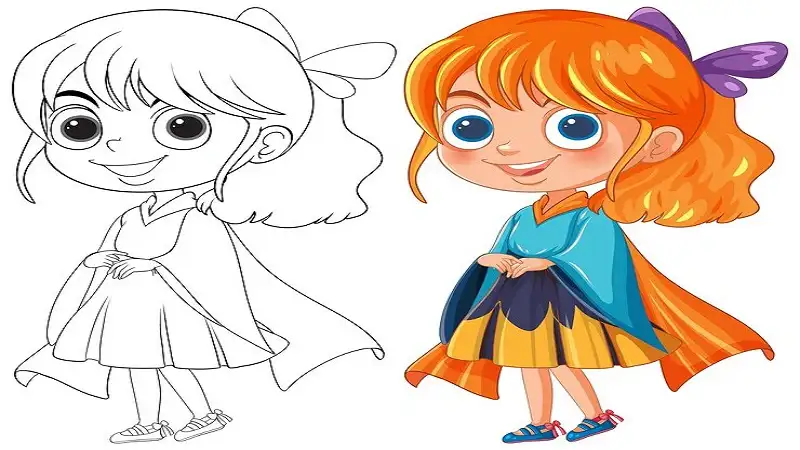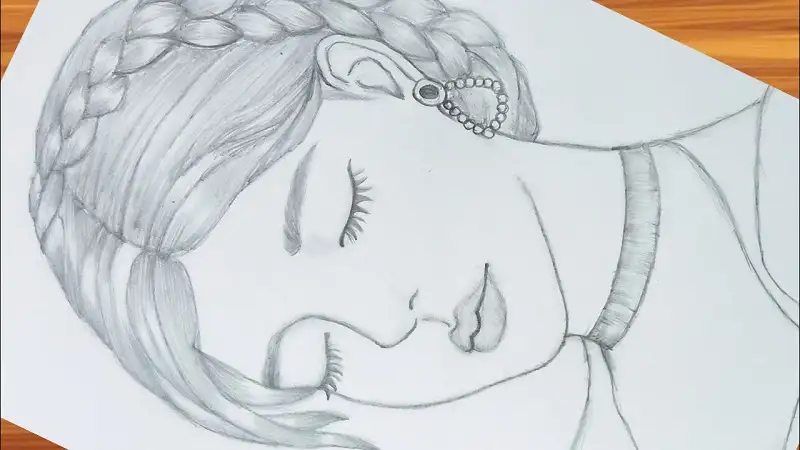Drawing is more than just putting pen to paper; it a means of expressing thoughts, emotions, and creativity. It allows artists to bring to life ideas and images from their imagination. Whether you’re a beginner or an experienced artist, mastering the skill of drawing opens up endless possibilities for personal expression. In this article, we’ll explore a unique concept titled “girl” and guide you step by step in understanding and creating intricate, expressive Girl:o9aveqjnvau= Drawing.
The World of Drawing
What Does Drawing Represent?
Drawing is a universal language, speaking across cultures and ages. It’s a method of storytelling that dates back to ancient times when people used cave paintings to record their experiences. Today, drawing continues to serve as a way to express emotions, thoughts, and narratives.
Why Drawing is Important for Personal Growth
For many, drawing is a form of meditation—a way to clear the mind and focus on creativity. It’s a journey of self-expression, improvement, and exploration. Through drawing, we can challenge ourselves and grow not only as artists but also as individuals.
History of Drawing
How Ancient Civilizations Used Drawing
Girl:o9aveqjnvau= Drawing has existed for thousands of years. Early humans used simple materials like charcoal and rocks to create images on cave walls. These primitive drawings documented daily life, religious beliefs, and aspirations.
Evolution of Drawing Techniques Over Time
Over centuries, drawing techniques evolved, from sketching on papyrus in Egypt to the fine art masterpieces of the Renaissance. Each period added new tools and methods, helping artists hone their skills and further develop the art form.
Understanding “girl” – A Unique Artistic Concept
Defining the Concept
“girl” is an abstract artistic expression. While the term itself may sound enigmatic, it refers to an innovative approach to Girl:o9aveqjnvau= Drawing, focusing on creativity and emotional depth. It embodies the balance between modern techniques and classical representations of femininity.
Cultural and Artistic Influences Behind “girl”
This unique concept draws inspiration from a blend of anime, realism, and digital art cultures. It fuses elements of Japanese manga with the delicate nuances of classical portraiture, allowing for the representation of complex emotions and detailed features.
Techniques for Girl:o9aveqjnvau= Drawing
Starting with the Basics – Shapes and Proportions
When drawing a girl, it’s essential to start with basic shapes—circles, ovals, and lines to build the structure. Establishing the correct proportions of the head, body, and limbs is key to creating a balanced figure.
Drawing Facial Features Accurately
Facial features bring the drawing to life. Pay attention to the positioning of the eyes, nose, and mouth.
Focus on Eyes, Nose, and Mouth
The eyes are the focal point of any portrait. They convey emotion and personality. Practice different eye shapes and expressions. Follow that by drawing the nose and mouth in proportion, ensuring symmetry and balance in the face.
Adding Personality and Emotion
Using Body Language and Expression
Body language is just as important as facial expressions. Whether you want to depict happiness, sadness, or contemplation, the position of the head, arms, and posture conveys the emotion you want to express.
Hair and Clothing Details
Hair and clothing also add a personal touch to your drawing. Whether you’re sketching flowing locks or textured fabrics, these elements give your character depth and personality.
Shading and Coloring

Importance of Light and Shadows
Shading can make or break a drawing. Light sources and shadows bring depth and realism to your artwork. Experiment with shading techniques to make your girl drawing three-dimensional and full of life.
Color Choices and How They Influence the Drawing
Choosing the right color palette can dramatically affect the mood of your drawing. Soft pastel tones can evoke innocence and serenity, while bold, vibrant colors might suggest strength and confidence.
Digital Drawing vs. Traditional Drawing
Tools for Digital Drawing
With the rise of technology, many artists are moving towards digital drawing. Tools like graphic tablets and drawing software such as Adobe Photoshop or Procreate have opened up new creative possibilities.
Advantages and Challenges of Digital Art
Digital art allows for greater flexibility, easy corrections, and endless color options. However, mastering these tools takes time, and transitioning from traditional drawing to digital can present a learning curve.
Inspiring Creativity Through “girl“
How to Build a Unique Style
Finding your unique style is crucial as an artist. Experiment with different techniques and mediums until you find a blend that feels authentic to you.
Exploring Various Art Mediums
Don’t limit yourself to one medium. Explore charcoal, watercolor, pastels, and digital tools to expand your creative boundaries.
Challenges Artists Face When Drawing Girls
Proportion Issues and How to Correct Them
One common challenge artists face is getting proportions right. Make sure to sketch lightly and use guidelines to ensure everything aligns.
How to Keep Anatomy Realistic
Anatomy plays a big role in making your drawing believable. Study human anatomy to understand how muscles and bones affect the body’s structure and movement.
Mastering the Art of Detail
Intricacies in Hair and Fabrics
Details like strands of hair and the folds of clothing bring your artwork to life. These details may be time-consuming, but they significantly elevate the quality of the drawing.
How Details Bring Life to the Artwork
Subtle details, like the glint in an eye or the texture of a sweater, give your drawing dimension and make it more relatable and realistic.
Common Mistakes to Avoid in Girl Drawings
Overcomplicating the Design
While adding detail is essential, overcomplicating the design can overwhelm the drawing. Keep it balanced by adding details strategically.
Ignoring Proportions and Symmetry
Proportion and symmetry are crucial for a cohesive drawing. Constantly check and adjust your sketch as you work.
Tips to Improve Your Drawing Skills
Practice Regularly
Like any skill, practice is key to improvement. Dedicate time daily or weekly to practice your drawings, experiment with new techniques, and push your creative limits.
Seek Feedback from Other Artists
Join art communities or share your work online to receive constructive feedback. This will help you grow as an artist and refine your skills.
The Role of Inspiration in Drawing
Finding Inspiration in Everyday Life
Look around you. Whether it’s nature, architecture, or the people you meet, there’s inspiration everywhere. Keeping a sketchbook handy can help you capture ideas as they come to you.
How to Stay Motivated as an Artist
Staying motivated is challenging, especially when facing creative blocks. Set small, achievable goals and celebrate your progress along the way.
Conclusion: The Journey of Mastering Girl Drawings
Mastering the art of Girl:o9aveqjnvau= Drawing is a rewarding journey filled with learning, experimentation, and creativity. Whether you’re sketching traditionally or digitally, there’s always something new to discover. Keep pushing your artistic boundaries, and remember that every stroke brings you closer to your next masterpiece.
FAQs
1. What are the best tools for beginners to start drawing girls?
Beginners can start with a simple pencil and sketchbook. For digital drawing, software like Procreate or Krita are user-friendly for newcomers.
2. How can I improve my proportions when drawing?
Using guidelines and starting with basic shapes helps ensure accurate proportions. Also, practicing life drawing can enhance your understanding of human anatomy.
3. Should I start with traditional or digital drawing?
It depends on your preference. Traditional drawing offers a hands-on experience, while digital drawing provides flexibility and room for corrections.
4. What techniques can I use to add emotions to my drawings?
Focus on facial expressions and body language. The way you draw the eyes, mouth, and posture can convey a wide range of emotions.
5. How long does it take to become good at drawing?
This varies for each individual. With consistent practice and dedication, most artists see significant improvement within a year or two.
